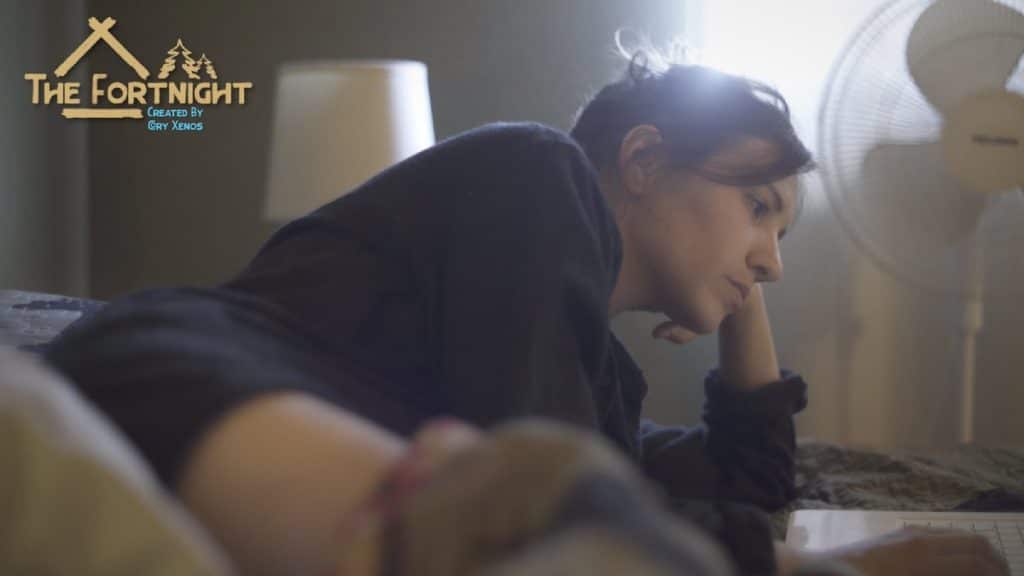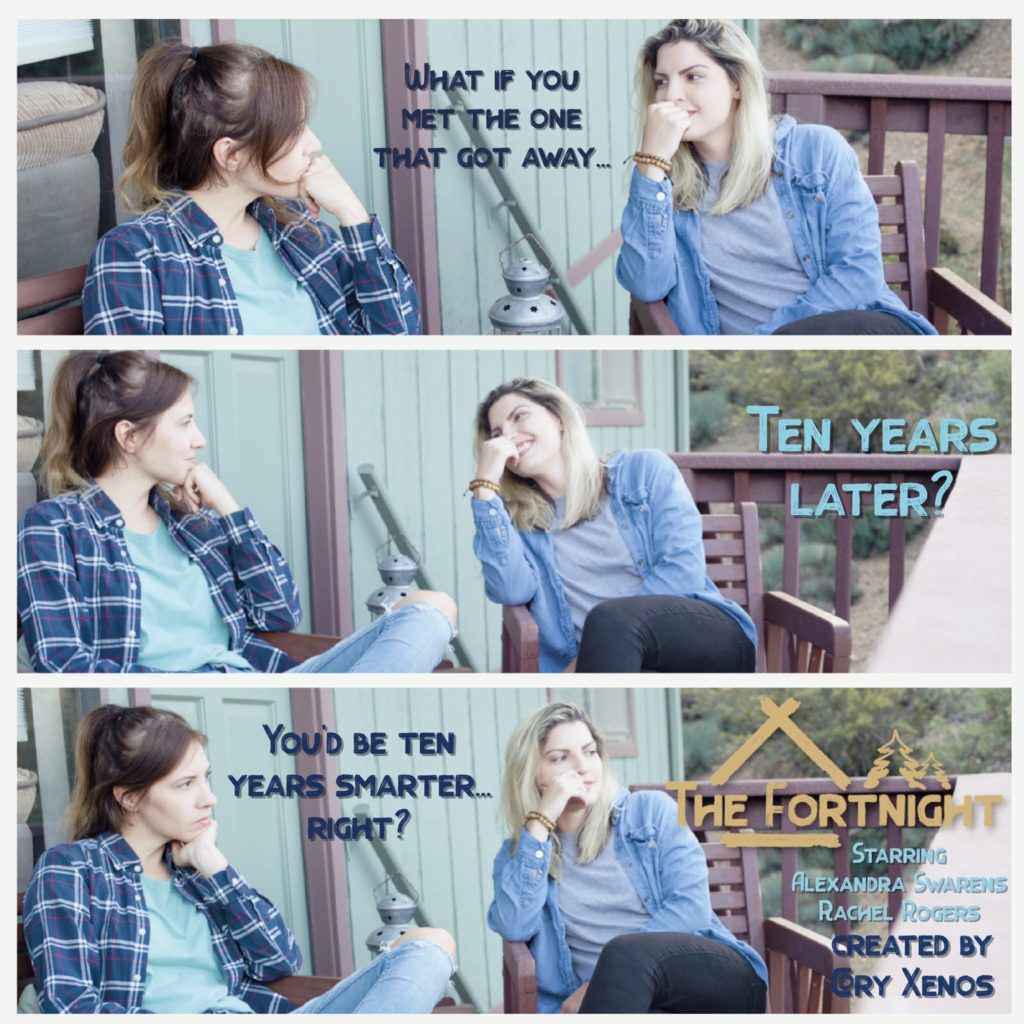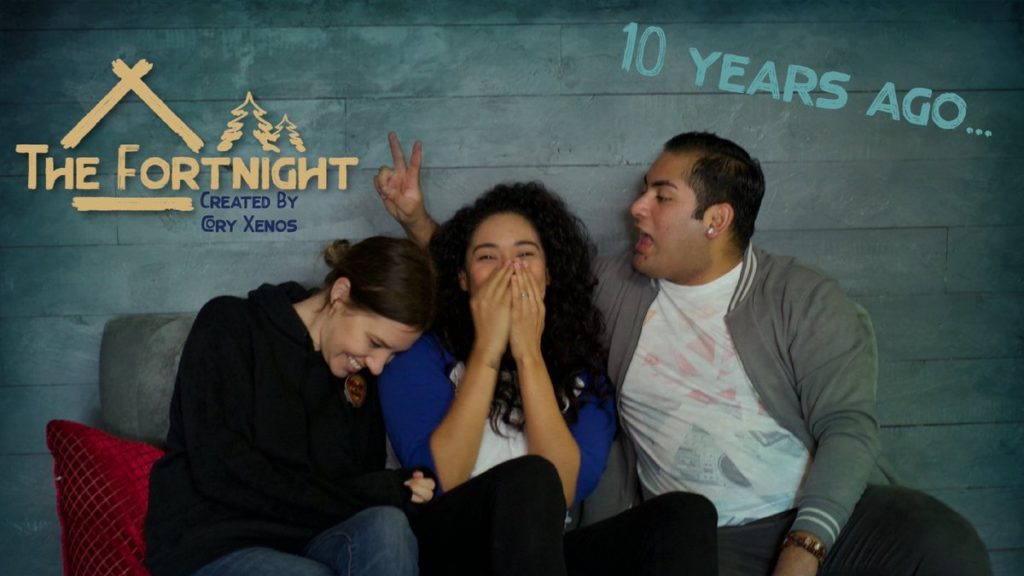Not to be confused with the videogame, The Fortnight is an upcoming web series that takes us to a familiar trope and queers the tale. When Peyton’s struck with writer’s block, she absconds to a cabin to course correct, only to come face to face with the girl who broke her heart.
Taking time out of her busy schedule of editing the series, Cory sat down with us for a chat about how the series came to be, what influences here, and how our parents say things that stick with us for a long time.
This interview has been edited lightly for clarity.
The Interview
Mika: Tell us a little about you. Where are you from and how did you get started in film?
Cory: I’m originally from Kansas, Kansas City and I moved to a really small town south of there call Lewisburg. Probably since the age of 7 or 8 I knew I wanted to be in the film industry. It as just a matter of, how do I as a queer female in a small town get out of here to do that? How does that happen? How do I pave that way?
I focused on theatre and film in high school and college. I went to university of Kansas, I went for a really long time because I wanted to make sure i was really prepared to do this thing. And I wanted to learn all the parts about everything. I felt it was more important to know a little bit about everything versus just only focusing on one aspect.
I moved out here to LA about nine years ago, this month actually.
Mika: Happy anniversary.
Cory: Thank you. It’s been really great. I did take a few years off. I was trying to get settled, and going from Kansas to California is a huge leap. I was really trying to figure out if this was what I want to do. Is filmmaking the thing I’m supposed to do?
The interesting thing about getting into [film] is a lot of people tell you no. Even if you’re just trying to be a PA. A lot of times they don’t understand why you just moved here, and they don’t think you’re reliable. It’s really hard to just get a door open to get in anywhere. It was frustrating, I was getting a lot of ‘no’s so I took a different route.
I was doing the Plan B to pay the bills and then I got into a relationship that was great, at the time, until it wasn’t. We just got to point where we weren’t growing in our dreams and the things that we wanted to do. We were stagnant. I thought that if I stayed in this [relationship], is that all there is for me? I feel like filmmaking is where I’m supposed to be. I feel like I have a voice to use. I need to do that.
So we broke up, it was a really bad breakup, but immediately after I got back into filmmaking. I started working on some LGBT webseries that were filming in LA. One being The Leslie.
I worked on season two of that with Kate Johnson. That was an awesome experience. I also worked on season two of It’s Complicated which is another LGBT webseries. Once I worked on those two, doors just started opening for me. I knew I wanted to be a creator but it was more what do I want to use my voice for? What stories do I feel are important to tell? How do I get the confidence to say, “Yes, I’m going to be a creator!” It’s a really big thing! But I’m there now. I’ve released a short film, I just released a feature film today, and now I’m doing Fortnight. It’s almost done.
It’s been a long journey, but it’s really exciting stuff.
Mika: I first heard about Fortnight and [thought] it was going to be a film, or did I mishear that?
Cory: You may have heard that. Originally I thought about making it a film, but I really love episodic content and I really wanted to play around with digging deeper into each of these things that are happening, in that episodic format. I was like, “I’m going to release this as a series. It feels right to do that.” We get 16 episodes of content. It’s pretty cool.
Mika: Webseries are a little different from a linear network in that when you write this, you’ve got the whole season out there for you. Does that change how you write?
Cory: It’s great because, for one I love having complete control over what is going to happen. I don’t have anyone in the writers room saying we should do this or this. I don’t have anyone over my head saying “Oh we don’t like this kiss, you can’t have that in this season” or you know — [laughter]
Mika: [laughter] Yeah, I know.
Cory: I don’t have to fight for those ideas that are there. It was nice to be able to lay it out from start to finish, knowing where I was going to end up with those characters. It wasn’t like “Alright, now we’re going to write the rest of this season, midway through! Now we’re gonna figure out where they go.” From the beginning I already knew where they were going, so that was really nice. That’s why I like webseries. You have more control and you can fully develop the ideas that you’re starting with.

Mika: It sounds like you’ve done a lot of aspects of this show. How many different hats did you get to wear during the production?
Cory: Pretty much all of them. I wrote it, I produced it, I was the cinematographer, I ran sound for a lot of it while I was shooting. I did get some help. We actually filmed in a cabin about an hour and a half north of here. There’s pretty much nothing up there, so getting people to come up was a task.
I’m also editing it, doing the colouring. I’m finding all the music. Music supervisor was something I always wanted to do and I just figured “Well when you do a webseries, you can do that yourself.” That’s a treat for me to be able to do that. Pretty much everything but acting. That’s not my forté, I’d rather be behind the camera.
Mika: What was your favourite role? Did you like the writing, the editor, or the colour adjustments?
Cory: Honestly, it’s a tie between the cinematography and the editing. For me, as a cinematographer, i think like a director but I’m able to do both at once. That’s a really beautiful process for me. But editing is where your story really happens. You shoot it, and you’re just looking at a bunch of this footage that doesn’t mean anything yet. And editing is where you get to really make it mean something, you’re putting in the music to hit those important moments. You’re choosing which moments that you shot and are really bringing out the story you’re trying to tell. That’s the best part.
Writing is not my best part. I say that because people say “Oh you’ve written these projects now, this and this and this” and I still don’t feel like a writer because that was never something I wanted to own. I just needed a way to get my story told. It’s such an important story to me that I don’t want to put it in someone else’s hands. I want it done a certain way.
There are things that only I know — [The Fortnight] is based on a true story — There are things that I know about the story that no one else could tell. They couldn’t tell it the way that I feel it should be told. Writing was just something that happened. I needed to get to the shooting part, to the editing part, and it wasn’t going to happen otherwise.
Mika: Seeing authentic stories told in authentic ways is really important to me. The majority of the shows I like to watch are ones where that is the case. Were there influences where you thought you saw something like your story being told?
Cory: This particular story, no. But the two shows that really made me feel like someone’s telling an authentic story, and that was what I wanted to do, growing up, Dawson’s Creek and Felicity. Those were two huge series in my life. I really felt like, especially with Felicity, that they were being authentic — up until the fourth season, then they got a little weird — they had a story that had a lot of heart, and I felt that it was the true journey of someone. This could be a real story. Those were kind of influences for me.
As far as the way that [The Fortnight] unravels, I don’t think I’ve seen anything like this. That’s the other great thing too, I feel like I’m putting something new out there. Which is queer! Which is great.
Mika: It is great. Webseries have been the forefront of diverse and inclusive television for almost a decade now. Ten years ago, if you wanted to see us on screen, you had to go a webseries. This is slowly starting to swing in a different way where we see more traditional television shows, like Tales From the City which Netflix just put on and Vida and other shows that are showing us a more diverse and realistic representation. Do you think that this is going to change the landscape for where webseries fit in?
Cory: It’s going to be interesting. I think we still have a strong place in webseries, no matter how much more content we’re seeing on traditional networks. I think where we’re truly getting the content that we fully feel is representative of us, I think it’s still going to be in webseries. It may make us work to up how we’re creating, maybe we’re looking for deeper stories or we’re upping our production values, because now we’re competing with network TV.
But the true fans and people who are searching for real content are still going to be coming to webseries. It may make it a little more difficult for us, but it’s kind of like a sacred place that no one can really touch.
Mika: We’ll get to see The Fortnight — it’s due out in January? Is that right?
Cory: Yes.
Mika: If you had one tweet to tell everybody why they needed to watch this webseries, what would it be?
Cory: Wow. How would I put that? “Love and life can change a lot in ten years … but how much really changes?”

Mika: That’s … that’s a really good question to ask ourselves!
Cory: That’s what I was telling the cast! we were shooting some promo photos, and I told them the direction I was going with [The Fortnight], because … you think that ten years ahead so much is going to be to be different in your life. You’re gonna respond to things in a different way, you’re gonna be ten year smarter, you wouldn’t make the same bad choices. But when you actually get there, think about ten years before now.
How different were you? Do you still make the same choices? Does ‘muscle’ memory come in to play when you’re just around someone you haven’t seen for ten years? Then all of the sudden you’re acting like you’re ten years younger. It’s things like that, that make this really interesting. We see [the characters] in the past, and then we see them in the present. And we see things happening that happened in the past just because we get into those situations where muscle memory takes over. It’s pretty interesting I think.
Mika: That sounds very interesting. It’s something that I think about a lot [with television], that we only get to see this small slice of characters. To get to see how we don’t change, and that realistic view of — You know when I see my parents I am twenty years old again. It doesn’t matter how old I get, I’m get to be stuck at about twenty.
Cory: Exactly. It’s been something I’ve been thinking about since I was a kid. There was a day where I asked my mom, I think she was 36 or 37 at the time, and I said “Mom, when did you start thinking like an adult?” And she started laughing and asked “What do you mean?” and I was like “Well I have a kid voice in my head but you have an adult voice. When does that change? When does that click for you?”
She said “I have the same voice I’ve always had in my head. I still think the same things I thought when I was younger. I might know more now, but I still have all the same thoughts that you’re thinking right now.”
I was like “Yeah, I don’t believe that.” And she was “You’ll see, when you’re thirty-something just think about it. You’ll see it doesn’t change, there are things that are innate in you that aren’t going to change, you just make different decisions.”
I thought that’s a concept we don’t ever think about. I want to put that into a script. So I was able to incorporate it into the story.
Mika: Do you think she’s right?
Cory: I think she’s right! I find myself still reacting to things in a certain way. When I see an episode of Dawson’s Creek I feel like I’m 15 again. I’m still having 15-year-old thoughts and I’m thirty-something now, how’s this happening? In a way, I think she’s right. I’m not going to make some of the same choices I did before, but yeah. I think, to a certain extent, she’s right. I get it now.
Mika: Our parents get smarter as we get older, I think.
Cory: [Laughter] It’s true!
Mika: We watch a lot of television, and of all the almost 2000 shows in the database, we’ve watched most of them. I’ve watched almost all of the webseries that we’ve added. But, like everyone else, I have my own totally guilty pleasures. I will not miss an episode of Critical Role or Project Runway at this point. What are your favourite shows on air now?
Cory: My number one guilty pleasure is Are You The One? on MTV. This year was great because it was all queer people. It was really nice. It’s my guilty pleasure. I love to study people, and I just really like seeing that many people in that many situations. It hooks me every time.
Mika: Is there anything you’d like to share with everyone about you or The Fortnight?
Cory: I think you should watch the Fortnight because we’re very includes. We have a trans non binary actor playing a trans non binary character. We have people of color, it is a queer show. I think that we’re telling a great story with a lot of heart, and I want a lot of people to feel included where they haven’t been included before.
Catch The Fortnight in January
You can follow Cory on Twitter at @coryx182 and The Fortnight itself at @FortnightWeb
You can watch the trailer now:
And don’t forget to watch The Fortnight when it drops in January.

Excellent interview. I have this flagged now to watch in January, thanks for the heads up.